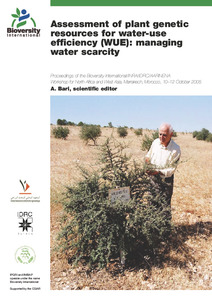Assessment of plant genetic resources for water-use efficiency (WUE): managing water scarcity: Proceedings of the Bioversity International/INRA/IDRC/AARINENA Workshop for North Africa and West Asia, Marrakech, Morocco, 10-12 October 2005
Although water is a renewable resource, its supply is not inexhaustible. It is unlikely that sufficient new water resources will be found to meet the projected increase in demand for water for food production, as existing water resources are already under pressure. It is vital, therefore, that existing resources be managed efficiently. This is particularly true with regard to agriculture, which utilizes more than two-thirds of the global water used by humans. Continued successful management of the limited amount of water available for agriculture is dependent upon better agronomic practices and an enhanced understanding of genetic variation for water-use efficiency (WUE) among crop genotypes, especially in areas prone to water scarcity. This document presents the proceedings of an inter-agency workshop dedicated to tackling the issue of water-use efficiency and water scarcity. Issues discussed relate to methods of managing water in agriculture, exploring opportunities for saving water and improving productivity by utilizing genetic resources, as well as other agronomic measures. The document is divided into three sections: the first section addresses themes related to water availability, current and future water needs, and water scarcity. The second section focuses on research strategies for a more efficient use of water resources - particularly in olive orchards - while the third section details the potential of genetic resources to manage water scarcity. It also addresses innovative approaches towards exploring the valuable genetic variation within crops, especially olives and almonds. The aim of the undertaking is to facilitate assessment of genetic variation for WUE and measurement of water requirements at the genotypic level, rather than simply at the crop level. Assessing plant genetic resources for complex traits such as those concerning water-use efficiency requires large numbers of samples to be taken. Lack of development of rapid, costeffective methods has hindered the use of WUE in practice and breeding. The effectiveness of characterization is also hindered by the lack of novel 'smart and rapid screens' needed to identify desirable traits in a cost-effective manner. The overview of concepts such as quantitative methods to model traits associated with water-use efficiency can also help in narrowing the phenotype gap. The overall aim of this text is to enhance the use of diversity through characterization, using novel approaches in order to improve productivity, and to ensure that knowledge about ongoing research on efficient water-use of plant genetic resources is readily available to all stakeholders.

